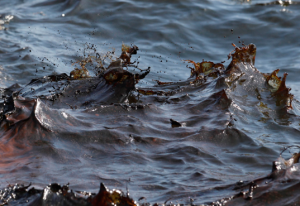Breaking Down The BP Settlement: Where Will The Money Go?
 Yesterday, the Justice Department announced BP agreed to plead guilty to 14 criminal charges stemming from the 2010 Deepwater Horizon oil spill and agreed to pay $4.5 billion in fines and penalties – the largest single criminal fine and largest total criminal resolution in US history. Attorney General Eric Holder emphasized several times that the announcement is only one piece of the government’s ongoing efforts to hold BP fully accountable for the deaths of 11 men and one of the worst environmental disasters in US history.
Yesterday, the Justice Department announced BP agreed to plead guilty to 14 criminal charges stemming from the 2010 Deepwater Horizon oil spill and agreed to pay $4.5 billion in fines and penalties – the largest single criminal fine and largest total criminal resolution in US history. Attorney General Eric Holder emphasized several times that the announcement is only one piece of the government’s ongoing efforts to hold BP fully accountable for the deaths of 11 men and one of the worst environmental disasters in US history.Here’s a rundown of what the settlement entailed and what lies ahead.
What were the charges?
•BP plead guilty to 14 counts: 11 felony counts of misconduct for the 11 workers killed at the rig, one misdemeanor count under the Clean Water Act, one misdemeanor count under the Migratory Bird Treaty Act, and one felony count of obstruction of Congress.
•Three BP employees were also charged, two of them with manslaughter.
Where will the money go?
In addition to the size of today’s resolution, the settlement is also historic in its dedication of the majority of funds to the affected Gulf Coast states for environmental restoration.
•$2.4 billion will go to the National Fish and Wildlife Foundation, – an independent, non-profit conservation group chartered by Congress in 1984. The funds will be paid out over a period of five years and be earmarked for environmental restoration and preservation in Gulf states.
•$350 million will go to the National Academy of Sciences for oil spill prevention, education, research, and training – also to be paid out over five years.
•More than $1 billion will go to the Coast Guard’s Oil Spill Liability Trust Fund, overseen by the U.S. Coast Guard to be available to pay for future oil spill cleanup.
•The oil giant will also pay $525 million to resolve claims with the Securities and Exchange Commission for misleading its investors regarding the size of the Deepwater Horizon spill.
What additional aspects of BP’s liability have not been resolved?
Yesterday’s settlement was just one step toward determining full liability for the catastrophe, with the largest potential penalties still remaining.
•Civil penalties under the Clean Water Act are the largest potential fine, as the company will be charged up to $4,300 per barrel of oil spilled. Holder indicated that the government will pursue the maximum penalty, which could result in a fine as large as $21 billion.
•Federal and state Natural Resource Damages claims also remain outstanding. Historically, these have taken the longest to resolve. In the case of the Exxon Valdez spill, they took more than a decade to settle.
•State economic loss or private civil claims that aren’t covered by the $7.8 billion settlement announced in March.
The people and ecosystem of the Gulf Coast continue to struggle with the devastating impacts of the Deepwater Horizon spill – and will likely do so for many years to come. Therefore, it is encouraging that the government has structured the settlement to ensure the majority of penalties paid by BP are returned to the impacted states to begin the painstaking process of environmental and economic restoration. The bipartisan RESTORE Act, which passed Congress in June, is a critical piece of legislation also aimed at achieving that end. The bill requires 80 percent of civil fines paid by the responsible parties under the Clean Water Act to be diverted to the five Gulf states impacted by the spill, rather than to the general treasury.
Today’s action marks an enormous step forward in the enduring effort to make the Gulf Coast whole again. In order to truly hold the responsible parties accountable for the Deepwater Horizon tragedy and ensure long-term recovery of the hard-hit region, the Administration should continue to pursue the maximum penalty in remaining civil fines and damages.
You can return to the main Market News page, or press the Back button on your browser.

